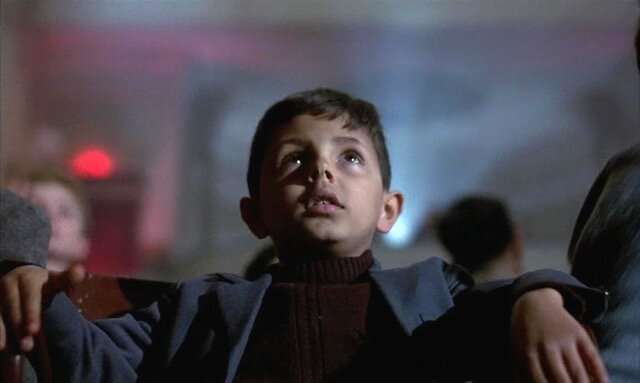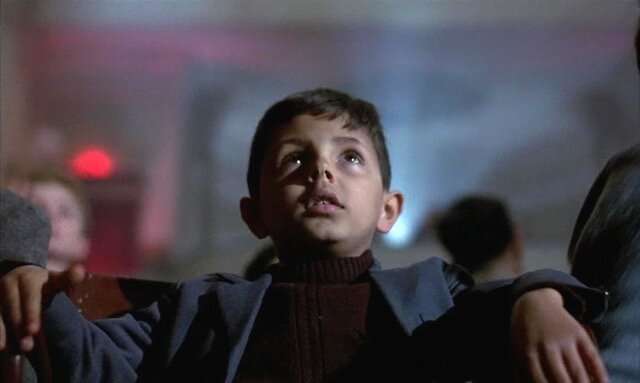

One of the most important things about movies—or a piece of music, a good book, or a theatre show—is that they have the abstract superpower of climbing into your being, burrowing themselves deep, and festering there for long periods of time. Let them linger long enough and they become nostalgic. No, a trigger for nostalgia. Without a trigger, the concept ceases to exist, quickly snuffed out like a candle being deprived of the oxygen around it. It’s on the shoulders of that very specific idea of nostalgia, and triggers for nostalgia, that Guiseppe Tornatore builds his Cinema Paradiso.
For successful film director Salvatore De Vita, a trigger is a name: “Alfredo”. He’s immediately transported to the movies. A small, empty theatre, where a younger Salvatore, or “Toto” (played magnificently by Salvatore Cascio) mischievously peeks through red velvet curtains as his town’s local priest sits in the audience, watching every movie, sternly ringing a bell every time he notices a frame resembling anything close to explicitness. It’s a signal to the projectionist, the aforementioned Alfredo, to edit out said frames, leaving a gap in the film where they once lived – a censorship that is resented by the local community of cinema-goers (“twenty-years going to the cinema and I’ve never seen a kiss!”). Despite that, the cinema is packed every night, and it doesn’t take long for Toto to hustle a job with Alfredo inside his projection room littered with tidbits of nostalgia in and of themselves; Buster Keaton posters; strips of celluloid; pin-ups of classic film scenes—an unofficial museo del cinematica.
“Don’t come back. Don’t give in to nostalgia. Forget about us” Alfredo warns an adolescent Toto later in the film, as he prepares to leave for Rome. He might not be wrong. The big studios have caught on to the immense power of nostalgia and been weaponizing it as aggressively as ever. For them, a trigger is an iconic musical phrase or theme they can use to inject some juice into the trailer of the next soulless franchise reboot. Tornatore, on the other hand, tenderly utilises nostalgia with the knowledge that, if measured correctly, it can remind us of what we loved, why we loved it, and why we needed to let it go.
Around the cinema of nostalgia, life happens. A group of men overflow from a tiny local bar—the “Bar Centrale”—where Ciccio from Naples wins the football lottery and promptly faints; women dry tomato paste under the Mediterranean sun; kids play pranks on the unsuspecting authority. Elsewhere, Salvatore’s mother is grieving the death of her husband, a victim of World War II. She weeps as she walks with Salvatore, while he notices a faded poster for Gone With The Wind. Everything comes back to the movies. It’s here where Tornatore plants all the fireworks, all the laughter and tears and microcosms of a community dealing with the trauma of the war. Prostitution, masturbation, assasination. Breastfeeding, baby-making, children smoking cigarettes. The rich spit on the poor! the poor throw shit in the face of the rich! A group of people, together watching a movie. If ever there was a phrase that’s aged into cliche, it’s “the magic of the movies,” but it’s hard to describe the way Tornatore presents the movies within his movie without resigning yourself to it. Romance oozes from every sequence. Alfredo exclaims “abracadabra!” and turns the projector mirror to face an open window, illuminating the house opposite with Mattoli’s The Firemen of Viggiu. The forlorn group who were denied entry to that evening’s screening now exclaim in response: “Over there, look! The Cinema!”
Later, Salvatore realises he’s fallen in love, only after watching the girl, Elena, through playback of a reel of film he took earlier that day. It’s crystal clear that in Tornatore’s eyes, the act of cinema-going is one and the same with the act of living. Still, just in case, he hammers it home with one last glorious sequence that might stand with cinema’s greatest endings of all time, in which Salvatore, now pushing fifty and having returned to Sicily from Rome for Alberto’s funeral, plays a reel of film—a parting gift from his old friend—collecting every kiss, flash of skin, and moment of passion he was once forced to censor. Salvatore watches on nostalgically with tears of joy as Ennio Morricone’s immortal score reigns in accompaniment. Paradise.



